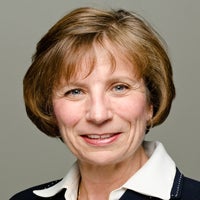Beyond Medical Care: Why Health Professionals Must Consider Where We Live, Learn, Work and Play
Presented by Susan B. Hassmiller, RN, PhD, FAAN, 11/18
Presented as a part of the Building a Culture of Health ConferenceOverview
Maintaining a healthy society is about much more than the relationship between patients and doctors. General health is dependent on a myriad of factors — access to proper health care, proximity to clean water and air, quality of education, access to economic opportunities, safety of one’s community and workplace, etc. The different conditions under which people live help explain why some are generally healthier than others.
Social Determinants have been estimated to account for up to 40 percent of the variance in health, yet the United States spends far less on social needs and more on healthcare than other developed countries. It has become increasingly clear that upstream thinking and consideration of social factors are essential for preventing illness and improving health outcomes.
This presentation will give an overview of social determinants of health and describe how health professionals are collaborating to address social disparities. It will also detail initiatives and opportunities at the state and national level that are aimed at building a culture of health, including leadership and research programs at the Robert Wood Johnson Foundation.
Learning Objectives
At the completion of the program, participants will be able to:
- State the health challenges facing the United States and explain how where we live, learn, work and play affects our health
- List three ways that health professionals are collaborating to address the social determinants of health
- Explain how they can address the social determinants of health in their workplaces
Speakers

Susan B. Hassmiller, RN, PhD, FAAN
Susan Hassmiller is the Robert Wood Johnson Foundation Senior Adviser for Nursing. In partnership with AARP, Hassmiller also directs the Foundation’s Future of Nursing: Campaign for Action. This 50-state and District of Columbia effort strives to implement the recommendations of the Institute of Medicine’s report on the Future of Nursing: Leading Change, Advancing Health and will additionally seek to build a Culture of Health. Hassmiller served as the report’s study director. She is also serving as Co-Director of the Future of Nursing Scholars program.
Hassmiller’s work has included service in public health settings at the local, state and national levels, including HRSA. She taught community health nursing at the University of Nebraska and George Mason University in Virginia.
Hassmiller is a member of the Institute of Medicine, now the National Academy of Sciences, a fellow in the American Academy of Nursing and sits on other advisory committees and boards, including the Hackensack Meridian Health System and the American Red Cross. She is the recipient of many awards and three honorary doctorates, but most notably the Florence Nightingale Medal, the highest international honor given to a nurse by the International Committee of the Red Cross.
This program is supported by a grant from the Rhode Island Executive Office of Health and Human Services
Health Care Workforce Transformation Project.
